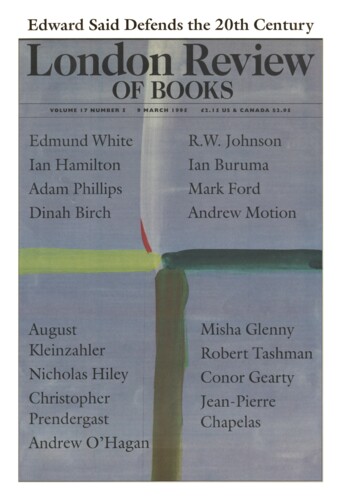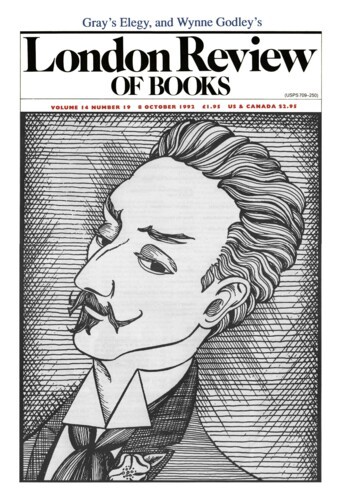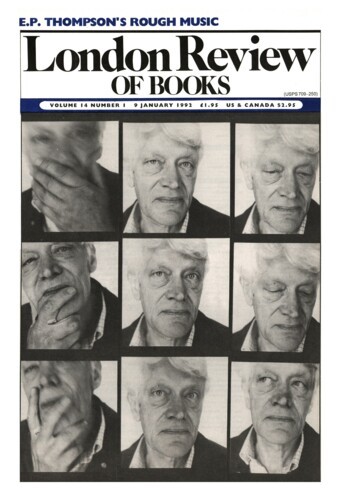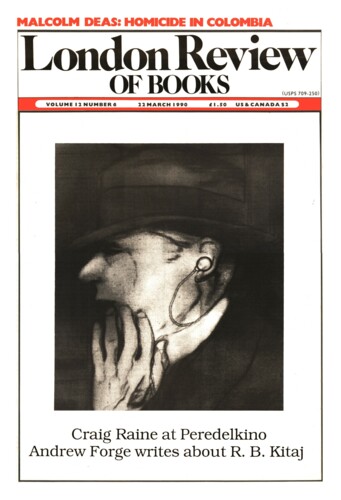Edna Longley
Edna Longley teaches at Queen’s University, Belfast. Her book Poetry in the Wars was reviewed by Patricia Craig on 19 February.
Call me Longley
8 October 1992
Irish Writing
9 January 1992
Belfast Diary: In Belfast
Edna Longley, 9 January 1992
Nina FitzPatrick’s Fables of the Irish Intelligentsia won the Irish Times/Aer Lingus prize for a first work of fiction, only to be disqualified when the pseudonymous author was deemed to be more Polish than Irish. This made the book the stuff of its own fables, which satirise an inbred and confused intellectual milieu. Since 1960 the Republic of Ireland has certainly provided grounds for confusion: modernisation and secularisation; the women’s movement; determined rearguard action from the Catholic Church; a conservative-radical split within the Church’s own ranks; a new urban youth-culture; urban-rural tensions aggravated by swelling Dublin; Northern Ireland; Europe; and – for the intelligentsia – Marxism, Post-Structuralism and all that. Ideological tides often reach Irish shores just as they start to ebb elsewhere.’
What the doctor said
Edna Longley, 22 March 1990
Most books offered as poetry never leave the condition of prose – which is not to say they are good prose. But when a prose voice enters poetry, it can clear and freshen the air. Beside Raymond Carver’s posthumous collection, the others I have been reading seem musty, costumed, made-up. Anyone who finds his poems flat or prosaic might consider Edward Thomas’s defence of Robert Frost: ‘if his work were printed [as prose] it would have little in common with the kind of prose that runs to blank verse … It is poetry because it is better than prose.’ A New Path to the Waterfall is poetry because it is better than prose. Another of Thomas’s insights into Frost also applies to Carver at his best: ‘with a confidence like genius, he has trusted his conviction that a man will not easily write better than he speaks when some matter has touched him deeply, and he has turned it over until he has no doubt what it means to him, when he has no purpose to serve beyond expressing it, when he has no audience to be bullied or flattered, when he is free, and speech takes one form and no other.’ Let the theorists make of that what they will.’
Pieces about Edna Longley in the LRB
Weasel, Magpie, Crow: Edward Thomas
Mark Ford, 1 January 2009
‘Prends l’éloquence et tords-lui son cou!’ Verlaine resonantly, and eloquently, declared in his ‘Art poétique’ of 1874. The line must have lodged in...
Like the trees on Primrose Hill
Samuel Hynes, 2 March 1989
In ‘The Cave of Making’, his elegy for MacNeice, Auden describes his friend as a ‘lover of women and Donegal’. The geography seems a bit wrong – the Irish counties...
Green War
Patricia Craig, 19 February 1987
Wars and battles: these words, appearing prominently in the titles of two of the books under consideration, might give the impression that poetry, or criticism, or the criticism of poetry, is a...
Valorising Valentine Brown
Patricia Craig, 5 September 1985
In a recent Times article, Philip Howard pounced on the deplorable word ‘Valorisation’ which seems to be trying to edge its way into the English language. ‘To enhance the price,...
Read anywhere with the London Review of Books app, available now from the App Store for Apple devices, Google Play for Android devices and Amazon for your Kindle Fire.
Sign up to our newsletter
For highlights from the latest issue, our archive and the blog, as well as news, events and exclusive promotions.




